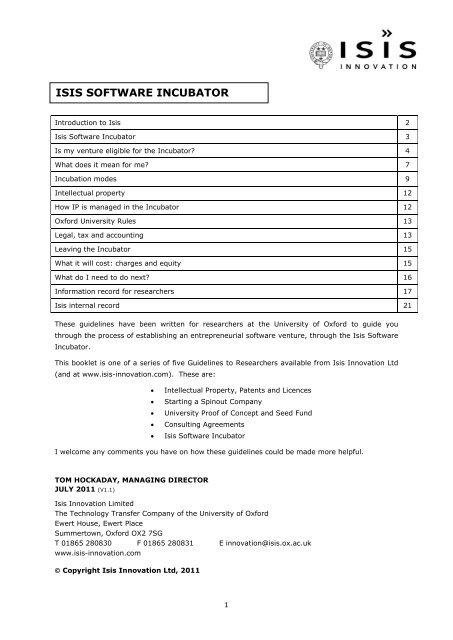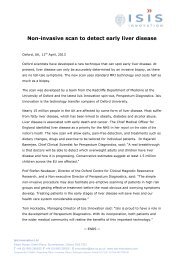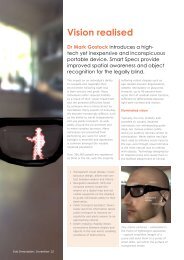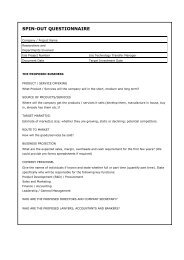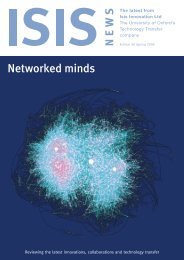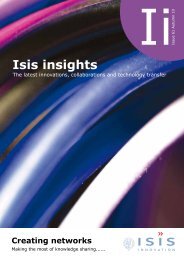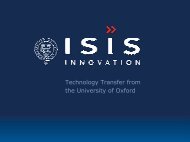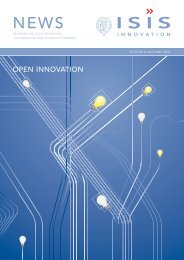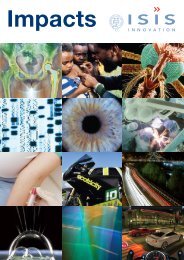ISIS SOFTWARE INCUBATOR - Isis Innovation
ISIS SOFTWARE INCUBATOR - Isis Innovation
ISIS SOFTWARE INCUBATOR - Isis Innovation
Create successful ePaper yourself
Turn your PDF publications into a flip-book with our unique Google optimized e-Paper software.
<strong>ISIS</strong> <strong>SOFTWARE</strong> <strong>INCUBATOR</strong>Introduction to <strong>Isis</strong> 2<strong>Isis</strong> Software Incubator 3Is my venture eligible for the Incubator? 4What does it mean for me? 7Incubation modes 9Intellectual property 12How IP is managed in the Incubator 12Oxford University Rules 13Legal, tax and accounting 13Leaving the Incubator 15What it will cost: charges and equity 15What do I need to do next? 16Information record for researchers 17<strong>Isis</strong> internal record 21These guidelines have been written for researchers at the University of Oxford to guide youthrough the process of establishing an entrepreneurial software venture, through the <strong>Isis</strong> SoftwareIncubator.This booklet is one of a series of five Guidelines to Researchers available from <strong>Isis</strong> <strong>Innovation</strong> Ltd(and at www.isis-innovation.com). These are:Intellectual Property, Patents and LicencesStarting a Spinout CompanyUniversity Proof of Concept and Seed FundConsulting Agreements<strong>Isis</strong> Software IncubatorI welcome any comments you have on how these guidelines could be made more helpful.TOM HOCKADAY, MANAGING DIRECTORJULY 2011 (V1.1)<strong>Isis</strong> <strong>Innovation</strong> LimitedThe Technology Transfer Company of the University of OxfordEwert House, Ewert PlaceSummertown, Oxford OX2 7SGT 01865 280830 F 01865 280831 E innovation@isis.ox.ac.ukwww.isis-innovation.com Copyright <strong>Isis</strong> <strong>Innovation</strong> Ltd, 20111
INTRODUCTION TO <strong>ISIS</strong><strong>Isis</strong> <strong>Innovation</strong> Ltd is the University of Oxford’s wholly owned technology transfer company. <strong>Isis</strong>was established in 1988 and in 1997 started a major expansion phase. <strong>Isis</strong> manages theUniversity’s intellectual property portfolio, working with University researchers on identifying,protecting and marketing technologies through licensing, spin-out company formation, consultingand material sales.<strong>Isis</strong> provides researchers with commercial advice, funds patent applications and legal costs,negotiates exploitation and spin-out company agreements, and identifies and managesconsultancy opportunities. <strong>Isis</strong> works on projects from all areas of the University's researchactivities: life sciences, physical sciences, social sciences and humanities.Patents & Licensing <strong>Isis</strong> files, on average, one patent application each week and manages over400 patent application families and 200 licence agreements. <strong>Isis</strong> licenses technologies tocompanies who invest in developing and selling products in a timely and ethical manner.Licensees are sought from all technology and business sectors on an international basis.Creating New Companies <strong>Isis</strong> has assisted in the formation of more than 60 University spinoutcompanies since 1997, generating significant value in equity holdings for the University ofOxford. <strong>Isis</strong> works with University researchers to develop new business opportunities, identifyingand sourcing investment, management and professional services.Consulting Oxford University Consulting (OUC) offers access to the expert knowledge ofUniversity researchers and departmental services within the University. OUC is part of <strong>Isis</strong>,providing a professional service dedicated to finding cost effective solutions to consultancy needs.Areas of expertise include problem solving, data analysis, expert evaluation, due diligence,management and business development. OUC’s activities meet the ISO 9001:2008 qualityassurance standard.Material Sales <strong>Isis</strong> manages the negotiation of sales agreements for biological and physicalscience materials developed within the University.The Oxford <strong>Innovation</strong> Society, founded in 1990, enables industrial companies to benefit from<strong>Isis</strong>’ activities by having a ‘window’ on Oxford science. Members enjoy advance notification of allpatent applications marketed by <strong>Isis</strong>, a regular newsletter, customised benefits, including seminarsand needs analysis, and attend meetings and dinners, which provide a unique environment forconstructive interaction between business leaders, investors and top University scientists.The <strong>Isis</strong> Angels Network introduces private investors and seed/venture capitalists interested ininvesting in spin-out companies from the University of Oxford to investment opportunities. IAN isa not-for-profit company limited by guarantee, established by <strong>Isis</strong> in 1999. Members of IAN mayalso be interested in serving as non-executive directors, nominated by the University, on theboards of the new spin-out companies.<strong>Isis</strong> has strong University links with all the parts of the University involved in technologycommercialisation and enterprise. These include Research Services; Begbroke Science Park;Oxford Science Enterprise Centre; and Entrepreneurship Said at the Saïd Business School.<strong>Isis</strong> Enterprise is a division of <strong>Isis</strong>, offering consulting expertise and advice in technologytransfer, based upon <strong>Isis</strong> <strong>Innovation</strong> Ltd’s success as Oxford University’s technology transfercompany. <strong>Isis</strong> Enterprise helps universities, research organisations and governments develop theirtechnology transfer activities.2
<strong>ISIS</strong> <strong>SOFTWARE</strong> <strong>INCUBATOR</strong>HELPING YOU TO BUILD YOUR OWN <strong>SOFTWARE</strong> BUSINESS<strong>Isis</strong> <strong>Innovation</strong> has an outstanding record of commercialisation of Intellectual Property (IP) fromthe University of Oxford. This includes helping University researchers establish a steady stream ofspin-out companies where <strong>Isis</strong>’ role involves attracting competent CEO’s and management teamsand supportive investors to exploit IP in a dedicated venture.<strong>Isis</strong> recognises that with the rise of software IP based on copyright and know-how only, and thegrowing ambition of young researchers to develop their own business, an additional path to a spinoutmay be appropriate in circumstances when a potential venture:builds on a combination of nascent IP and a credible business concept;but requires substantial work to develop further IP and build a realistic commercialprospect;has entrepreneur founders who are willing to invest the significant necessary effort todevelop the idea into a venture in their own time;but does not require immediate external investment or a dedicated full-time CEO.In particular software-based IP needs neither the expensive protection of a patent nor expensiveresearch facilities or product design, validation or trials. However, there is often a need to carryout some significant technical or commercial development to create the business opportunity, e.g.building a user-friendly front end for the software or building a customer base; this work is timeintensivebut does not (at least in the first instance) require external financial investment.The <strong>Isis</strong> Software Incubator was established in autumn 2010 designed by <strong>Isis</strong> to offer appropriatesupport for such ventures to develop products or services and begin to trade without externalinvestment. If you have an idea, software that can be developed into a product and the time andenergy to start your own Oxford University venture, then please consider the new <strong>Isis</strong> SoftwareIncubator.3
IS MY VENTURE ELIGIBLE FOR THE <strong>INCUBATOR</strong>?The Incubator intends to assist with the creation and development of a software businessopportunity, whether or not a limited company has yet been incorporated. The goal of theIncubator is to minimise overhead costs and risks in the most fragile stage of the venture creationand help to bring the venture to a state where it can stand on its own feet, make an attractiveinvestment proposition or even be ready for a trade-sale. For a business venture that has not yetbeen formed into a company, the <strong>Isis</strong> Software Incubator will accommodate early trade ifappropriate.The key characteristics of the candidate ventures at the point of entry to the Incubator are:Oxford input IP - The venture is based on a kernel of intellectual property (IP) whichoriginated at the University and serves as a platform for a potential product or service, butdoes not wholly constitute it; in other words the entrepreneur founders are expected toadd further value by developing more IP, transforming IP into products or services andimplementing the business concept.No patents – Because patent protection requires substantial financial resources and istime-consuming to manage, the software Incubator will only accept ventures based onintellectual property that consists of copyright, know-how or data or a combination ofthese.No investor – The software Incubator is targeted at ventures that need no initial financialinvestment to achieve trade revenue that can sustain the venture or to develop a productor service or make it a viable trade-sale target. No initial investment requirementdramatically lowers the need for upfront professional support but it also means that nocash is available upon the launch of the venture and that no fully-paid employees or CEOcan yet be afforded. The entrepreneur founders will therefore carry the lion’s share of thetechnical and business development work.Entrepreneur founders – The venture’s success will depend crucially on substantial inputfrom the entrepreneur founders to add value to the original IP and develop new IP. It isexpected that the entrepreneur founders are willing and able to commit very significanttime and effort to the development of the venture. This contribution by the entrepreneurfounders throughout the incubation phases is recognised in the equity held by theentrepreneur founders in the venture.It is possible therefore that researchers who contributed to the input IP have noinvolvement in the development of the venture and do not participate in its equity (thoughthey may have a financial interest through the licence to the venture of the originating IP).The <strong>Isis</strong> Incubator is targeted at entrepreneur founders that have a connection with theUniversity of Oxford and it would welcome in particular students and ex-students as wellas researchers. A typical entrepreneur founder may be coming towards the end of theirtime studying at the University, or reaching the end of a University post such as a post-docposition, and wishing to use the opportunity to develop their work into commercial reality.It is important that any entrepreneur considers the effort involved and ensures that theirUniversity and academic obligations are no impediment to their involvement with theventure. Finally participants should expect to have no or very few earnings during thedevelopment phase. Their reward will be in equity which may not always prove as valuableas hoped and is often not tradeable for a very long period.4
Compliance with funding obligations - As for any commercialisation project, theoriginating Oxford input IP may carry obligations to the funding bodies that sponsored theoriginal research and these obligations must be observed. Hence, it is possible that incertain cases these obligations may not align with commercialisation of IP through thisSoftware Incubator. <strong>Isis</strong> will advise researchers of such situations at the time of thecompletion of the due diligence of the input IP via Research Services.The Incubator is open only for software-based ventures.The table on the following page summarises the key differences between a venture that is likely tobe eligible for the Incubator, and a traditional University spin-out. This table is for guidance andyour <strong>Isis</strong> Technology Transfer Manager will be able to help you assess the appropriate choice:5
Software Incubator ventureNo initial investor is required, meaning that theIncubator venture does not require the sameextent of project management and support as atraditional spin-out, as illustrated on the right.Note that Incubator ventures may eventuallydevelop to a point where external investment isrequired, and the Incubator can help with thisthrough mode 3 (see page 9).Originating IP is a starting point for a potentialproduct or service but must be added tosubstantially. The starting IP has no commercialprospect without development and thisdevelopment can neither happen in theUniversity nor is an investor prepared to investin it yet.No patents/patent applicationsEntrepreneur founders commit very substantialtime to growing the business themselvesthrough software and/or business development,including once they have left their Universityposition. The entrepreneur founders are theprimary resource for the new business. The <strong>Isis</strong>Software Incubator anticipates thatentrepreneur founders will be, for example,DPhil students reaching the end of their studies,or post-doctoral researchers reaching the end oftheir contracts.University infrastructure and environment arenot essential for generating a viable venturebusiness opportunity; the development of theventure cannot realistically happen within theUniversity.The business develops through trading, thoughinvestment may one day be required to fuelgrowth.The venture operates in Mode 1 and/or 2 first(see page 9), through which the founderentrepreneur ‘invests’ considerable time andeffort to develop the business through theIncubator to make the venture attractive toexternal investors. The venture would usuallytrade in advance of investment and theincorporation of the company is not linked withinvestment.University of Oxford & <strong>Isis</strong> conventionalspin-outSignificant external investment is required. Thismeans investor networking and presentations, abusiness prospectus, shareholder agreementnegotiations, extensive legal support, a CEO,service contracts, a formal board andgovernance procedures and much more arerequired to create a legal structure that protectsthe interests of the investor, the University andthe Founders (i.e. the absent minorityshareholders)Exploitation of the originating IP to fulfil itscommercial potential is the major impetus ofthe company.Predominantly patent basedFounding academics are employees of theUniversity and are supportive of thedevelopment of the spin-out opportunity withinthe constraints of their academic and teachingresponsibilities. Once the spin-out is establishedthey most likely retain their academic positionswith an ‘arms length’ relationship to the spinout,often providing consultancy services and/oracting as non-executive directors, althoughresearchers may leave to join the company.Further resource for the business is providedthrough external recruitment of all operationalstaff once investment is in place.The spin-out opportunity cannot be developedto a point where it is able to attract externalinvestment without University infrastructure,support and environmentThe business does not trade before first roundinvestment, and often for many years after thisas the underlying technology is developed formarket.In the <strong>Isis</strong> conventional spin-out, theincorporation and first investment/dilution arelinked events. The spin-out does not tradebefore investment.6
WHAT DOES IT MEAN FOR ME?Once your software business venture has joined the <strong>Isis</strong> Software Incubator as an ‘IncubatorProject’, you will benefit from advice and support during the time your venture spends in theIncubator (see section ‘Services and Support’ below).<strong>Isis</strong> has experienced and able staff with a long track record of successful commercialisation; wehope that working together, the founder entrepreneurs and <strong>Isis</strong> will be able to focus on creatingthe product and customers and will build a business with a much greater chance of success thanwould be possible without <strong>Isis</strong>’ help.We will work together to decide whether a venture is appropriate to enter the <strong>Isis</strong> SoftwareIncubator and the timing of this. All entrepreneur founders will be asked to enter into anagreement with <strong>Isis</strong> to ensure that each party understands the terms and conditions of theIncubator.There are different Modes for projects in the Incubator; these are described on page 9.Services and SupportDepending on the specific needs of each individual venture and the Mode in which it is operating,the <strong>Isis</strong> Software Incubator aims to offer the following to entrepreneurs:- commercial mentoring;- negotiating expertise to help achieve good pricing and legal terms for the venture’s firstdeals;- IP advice and management (including access to the Due Diligence services of theUniversity for IP assigned to the University);- Confidential Disclosure Agreements;- in Mode 1 (see page 9) services such as Accounting, Insurance and Legal services; but NB<strong>Isis</strong>’ legal support acts on behalf of the University and <strong>Isis</strong> only and is not able to giveformal legal advice to others.;- a ‘shop window’ including facilitation for an internet presence;- business enquiry handling;- assistance with applications for translational funding, where appropriate- search for additional management and investors if appropriate;- advice on the creation of a limited company and help with necessary legal documents e.g.shareholder agreements, articles, service contracts, option agreements*;- assist with identifying (sub-)licensees;- <strong>Isis</strong> representation on the Board (as observer or director) once the venture is incorporatedin Mode 2 or 3;- connection to the Said Business School & Centre for <strong>Innovation</strong> and Entrepreneurship;- facilitation of the use of ‘Oxford’ in the venture’s name or brand (a formal trademarklicence from the University is required for this);- access to meeting rooms, phone access;- shared IT facilities for development and operations (subject to availability)- access to the <strong>Isis</strong>/Oxford investor and professional advisor network including banks,lawyers, accountants, tax advisors, marketing agencies and more;7
- access to <strong>Isis</strong>/University sponsored events, e.g. the Venture Fest or Oxford <strong>Innovation</strong>Society meetings;- facilitate the sharing of resources between incubatees where such opportunities arise.As well as offering the listed support, the <strong>Isis</strong> Software Incubator allows the ventures to tradebefore the costs and risks of full incorporation and with the commercial assistance of experienced<strong>Isis</strong> Technology Transfer Managers.<strong>Isis</strong> will also endeavour to make available specific software development and trading resources butas the requirements are likely to differ between ventures and will change over time, suchresources cannot be guaranteed but will be communicated to the incubatees when they areavailable.8
INCUBATION MODESThe Incubator is able to help ventures in three distinct stages of development, or Modes:1. Pre-incorporation - the venture is not yet registered as a limited company2. Incorporated without external investment - the venture is registered as a limited companyand has no initial need for external investment3. Incorporated with need for external investment - the venture is registered as a limitedcompany and has now reached a stage where it requires external investment.Note that a venture may only enter Mode 3 through development within Modes 1 and 2 of theIncubator, i.e. a venture will not join the Incubator directly into Mode 3.A fuller description of each Mode follows below:Mode 1: pre-incorporationIn the earliest stages of the development of a software based product or service basedon the input IP, the costs and burdens of an incorporated company may not yet bejustifiable. <strong>Isis</strong> will allow and enable a venture to operate from within the corporateframework of <strong>Isis</strong> <strong>Innovation</strong> Ltd.Within certain practical limits and whilst observing strict legal and financial controls similarto any internal <strong>Isis</strong> project, the venture can at this stage work to develop, market andtrade its products and services through the Incubator.The entrepreneur founder cannot yet be an employee of the company (as it is not yetincorporated) and so has to be a member of staff of the University, a student of theUniversity or be self-employed.An <strong>Isis</strong> Technology Transfer Manager will oversee the operations of the venture and, as itoperates as part of <strong>Isis</strong>, <strong>Isis</strong> has exclusive signing authority on behalf of the venture.During Mode 1 there will be regular ‘board’ meetings between the entrepreneur foundersand the <strong>Isis</strong> Software Incubator managers no less than every 3 months.It is appropriate for the venture to enter Mode 1 when there are no or insufficient revenuesor reserves to sustain the costs to be a company. However, the venture trades equity inthe future company for the services of the Incubator (i.e. <strong>Isis</strong>) to create an incentive forthe venture to exit this Mode as soon as it is able to do so.Mode 2: company is incorporatedIn Mode 2 a company is created thus allowing the venture to assume its ownresponsibilities as a legal entity. This will require incorporation but also insurance,accounts and formal company returns to Companies House, employer’s duties and similarobligations. At this stage the venture is a fully fledged business.At this stage the initial equity has been allocated and it would not be practical to continueissuing equity as a means of payment for services to <strong>Isis</strong>. Instead the Incubator will chargea cash levy for its services. For the entrepreneur founders it is attractive to transfer fromMode 1 to Mode 2 as there is no longer a requirement to pay for Incubator services withequity; the Mode 2 activities are only available if there is revenue or other access to cash.9
Mode 3: company is incorporated and requires investmentThe venture may reach a point where external investment is required or desirable toaccelerate growth and the Incubator can assist with this through Mode 3. There areimportant differences between the routes to reach investment in Mode 3 and first roundinvestment for a traditional spin-out. In the traditional spin-out the incorporation and firstinvestment/dilution are linked events and the spin-out does not trade before investment.In the Incubator, the venture operates in Mode 1 and/or 2 first, the founder ‘invest’considerable time and effort to make the venture investable and the venture would usuallytrade in advance of investment. Because of this, a venture is not eligible for the Incubatorif there is an immediate need to raise investment and ventures may not enter theIncubator directly into Mode 3 in order to raise investment.It is normally expected that the venture will exit the Incubator once an investment ismade, but in exceptional cases the venture may continue in the Incubator in this Mode 3.Transitions between ModesWhilst a venture is in Mode 1 the equity claim on behalf of <strong>Isis</strong> grows in lieu of charges asdetailed on page 15 in the section “What will it cost: Charges and Equity”. When theventure incorporates that equity claim is exercised and shares are issued to <strong>Isis</strong>.Once incorporated the venture may leave the Incubator or enter into Mode 2 and continueto receive ongoing support in return for a monthly cash service charge.If a venture incorporates immediately upon entering the Incubator (i.e. enters into theIncubator in Mode 2), the minimum equity claim for <strong>Isis</strong> still applies as a reward for theassistance from <strong>Isis</strong> to incorporate and the framework provided by the University and <strong>Isis</strong>.If the venture transits from Mode 1 or 2 into Mode 3, i.e. incorporates with the help of anexternal investor (and CEO) identified with the help of the Incubator, then the <strong>Isis</strong>Technology Transfer Manager will provide all necessary support. Nevertheless this does notattract an automatic additional equity claim: <strong>Isis</strong> already has an interest and this will gainin value upon investment. On the other hand, a rapid Mode 1 to Mode 3 transition shouldnever be confused with a traditional spin-out as only a venture that evidently uses theIncubator for pre-investment development and value growth is eligible.If the venture exits the Incubator and subsequently finds external investment or anacquisition independently, <strong>Isis</strong> has no additional claim beyond the equity previouslyawarded (and any rights attached to those shares).10
INTELLECTUAL PROPERTYIntellectual Property (IP) is ideas, information and knowledge; in the University context IP canbe viewed as the results and outcomes of research. “Intellectual” because it is creative output;and “Property” because it is viewed as a tradable commodity.Intellectual Property Rights (IPR) are specific legal rights which protect the owners of IP. IPRcan be subdivided into 6 major categories, summarised in the table below:IPR CategoryCoversFormalMaximum durationapplicationprocessPatent Inventions Yes 20 yearsCopyrightLiterary, musical, artisticworks, & softwareNo70 years after death ofauthorRegistered Design Image; look & feel Yes 25 yearsRegistered Trade Mark Name, logo Yes UnlimitedConfidential InformationUnpublished secretinformationNoUnlimitedDatabase Right Databases No 15 YearsSee the <strong>Isis</strong> Researcher Booklet ‘Intellectual Property, Patents and Licensing’ for furtherinformation (available from <strong>Isis</strong> and www.isis-innovation.com).HOW IP IS MANAGED IN THE <strong>INCUBATOR</strong>Pre-venture IPOxford input IP with which the venture starts will be licensed to the venture via <strong>Isis</strong> onreasonable commercial terms. IP developed externally from Oxford but prior to entry ofthe venture into the Incubator will need to be assigned to <strong>Isis</strong> to ensure that all IP requiredfor the venture is gathered together in one place.IP developed whilst the Venture is in Mode 1If the developer is still a student or employee of the University then IP developed in theventure whilst in Mode 1 will be owned by the University according to University Statute.There is no automatic pre-emptive right by the venture on this IP. However, <strong>Isis</strong> will seekthe most appropriate route for commercialisation of that IP, and this may well be theventure if all is going well. The IP will be assigned to <strong>Isis</strong> and licensed via <strong>Isis</strong> in the usualmanner.IP developed in the venture whilst in Mode 1 by a developer who is NOT a student oremployee of the University cannot be owned directly by the venture because it is not yet alegal entity. Therefore in Mode 1 it will be assigned to <strong>Isis</strong> with the intention to assign theIP back to the venture upon incorporation. This has the advantage that the IP is in a ‘safe’place should the venture not succeed and could be licensed to another entity, with benefitsto the developer.12
IP developed whilst the Venture is in Mode 2 or 3IP developed in the Venture whilst in Mode 2 or 3 will follow the University Statutes andRegulations: If developed by a student or employee of the University it will be owned bythe University. <strong>Isis</strong> will seek the most appropriate route for commercialisation of that IPand this may well be the venture if all is going well.IP developed in Mode 2 or 3 by staff of the venture (assuming they are NOT students oremployees of the University) will be owned by the venture (subject to any existing otherarrangements), because the venture is now incorporated and as such it is able to ownproperty.All IP that is owned by or assigned to the University will undergo the usual due diligence andsubsequently be assigned to <strong>Isis</strong> for commercialisation.OXFORD UNIVERSITY RULESAlthough <strong>Isis</strong> <strong>Innovation</strong> is a wholly owned subsidiary of the University of Oxford, the conditions ofemployment of University staff are a matter for the University, and <strong>Isis</strong> cannot adjudicate onthem. Nevertheless, <strong>Isis</strong> has been given responsibility for presenting new venture opportunities tothe University for approval. We can direct you towards the relevant University Statutes, Decreesand Regulations if you need advice. <strong>Isis</strong> will make every effort to guide you through the relevantprocedures, in conjunction with the appropriate University officers.LEGAL, TAX AND ACCOUNTINGLegalIn Mode 1 all activities by the venture will be under the legal ‘umbrella’ of <strong>Isis</strong> andtherefore it will be subject to control by <strong>Isis</strong> management and procedures.In Mode 2 and Mode 3 the venture will be a limited liability company incorporated underEnglish law. A limited liability company protects the owners from creditors; it will be aseparate legal person that can sue and be sued in its own right. As a legally responsibleentity it will be responsible for its own decisions. The <strong>Isis</strong> Technology Transfer Manager willguide the venture through its incorporation and ensure that it makes adequate provisionsfor legal advice, insurance and management awareness of its responsibilities.Board of DirectorsThe directors of the company (of which there must be at least one) will be appointed bythe shareholders. The directors are responsible for strategic management of the companyand will be personally liable for their actions as directors of the company. The Directorselect one of themselves to be the Chairman. As a shareholder <strong>Isis</strong> <strong>Innovation</strong> requirescertain information rights and also the right to nominate a non-executive director to theBoard. This may initially be (as director or observer) a member of <strong>Isis</strong> <strong>Innovation</strong>, or, asthe venture develops <strong>Isis</strong> may nominate an external non-executive director by agreementwith the venture, in order to bring a useful skill-set to the Board.13
Directors’ responsibilitiesThe legal responsibilities placed on each director protect creditors from the owners. Alimited company must have directors; directors must not continue trading when thecompany is insolvent; directors must keep accounts which reflect accurately; thecompany’s financial condition; directors are like trustees of the company, and must notbenefit personally at the company’s expense. Directors can be PERSONALLY LIABLE forthe activities of the business.Tax affairsThere is a plethora of taxes, tax schemes and benefits relevant to the various aspects ofcompany formation:CompanyValue Added TaxCorporation TaxNational InsuranceR&D Tax CreditsIndividualsCapital Gains TaxIncome TaxEnterprise Investment SchemeEnterprise Management IncentivesInheritance TaxThese change frequently as do the optimal ways of managing the tax liabilities. Up to dateprofessional advice is essential.At the time of writing it is possible that Mode 1 may not be as tax efficient as Mode 2. It isusually advisable to incorporate a new company as soon as possible so at the time theshareholders receive their equity its value is minimal and thus their exposure to incometax is minimal.Upon entry in the Incubator the <strong>Isis</strong> Technology Transfer Manager will be able to makeintroductions (but not recommendations) to tax advisors.AccountsIn Mode 1 all transactions will be via the <strong>Isis</strong> accounts and the Technology TransferManager will work closely with the entrepreneur and the University’s Financial Departmentto ensure that all matters are properly accounted for. In Mode 2 the venture will require itsown accounts and the <strong>Isis</strong> Technology Transfer Manager will be able to make introductionsto potential advisors (and Banks). At all times whilst in the Incubator, the <strong>Isis</strong> TechnologyTransfer Manager must have access to all accounts.14
LEAVING THE <strong>INCUBATOR</strong>If all goes well the venture will exit the incubator when it is able to sustain itself and when thesupport and services provided by the Incubator have had their benefit but are now of diminishedrelevance or can be provided from within the, now mature, venture itself. Upon exit anyoutstanding credits and debits will be settled or a mutually agreeable repayment plan will bearranged.Despite best efforts from all parties sometimes not everything goes to plan and circumstanceschange such that the venture proves to be unviable. If work on the software business venturecomes to an end whilst in Mode 1 this will not leave any residual charges to the entrepreneur butall IP will be retained by <strong>Isis</strong> so that it may still be commercialised.If the venture reaches a stage where it is to be suspended or closed down whilst in Mode 2, therewill be a number of administrative arrangements to be made with Companies House. All IP shouldbe assigned to <strong>Isis</strong>. This creates the possibility to still commercialise the IP through a licence toanother party, creating benefit for the inventors and developers. Any venture in the Incubator inwhichever Mode must undertake not to create a situation of insolvency. <strong>Isis</strong> must have access tothe venture’s accounts at all times.WHAT WILL IT COST: CHARGES AND EQUITYIn return for the Incubator services listed on page 7, the charges to the software business venturein the Incubator are:Mode 1The initial minimum charge is 10% of pre-money equity in the Venture.If the Venture is still in the Incubator Mode 1 after 8 months, the equity shareholding forthe University increases by 1% for each subsequent month or part-month.No Venture will exceed a further 10 months in Mode 1 (18 months in total) thus limitingthe shareholding of <strong>Isis</strong> to below 20%.Modes 2 and 3If entering the Incubator in Mode 2 or 3, the initial minimum charge is 10% of equity inthe Venture. There will be no further equity charge in Mode 2 and Mode 3 but theIncubator will make a cash charge, giving due regard to the importance of cash for anystart-up: the Incubator charge will be limited to the higher of £250 per month or 10% ofRevenue up to a limit of £10,000 per annum.No incubatee may stay in the Incubator for longer than three years.These charges described above are in return for the Incubator services on page 7. There is noadditional charge for <strong>Isis</strong> staff time or for reasonable use of <strong>Isis</strong> facilities such as meeting rooms orphotocopying.The shares in ventures arising through the <strong>Isis</strong> Software Incubator will be held in the name of <strong>Isis</strong><strong>Innovation</strong> Ltd and managed by <strong>Isis</strong> <strong>Innovation</strong> Ltd.If there is a need for any external expenditure incurred by <strong>Isis</strong> on behalf of the venture, this willbe treated on a ‘cash+10%’ recharge basis to the venture. Any external expenditure by <strong>Isis</strong> willbe agreed by <strong>Isis</strong> and those involved in the venture. For example, external expense may be15
equired for preparation of marketing materials, website design, application for a trademark,commercial software, IT hardware or services and more. If a venture has already accumulatedrevenues that can cover such expenses then the additional 10% charge will not apply.WHAT DO I NEED TO DO NEXT?Please contact <strong>Isis</strong> to discuss your proposed software business venture. You will need to completethe Information Record which is available from the <strong>Isis</strong> website and you will find on the next pagesof this Guideline booklet.Contact detailswww.isis-innovation.comTel: 01865 280830Fax: 01865 280831Email: innovation@isis.ox.ac.uk16
<strong>ISIS</strong> <strong>SOFTWARE</strong> <strong>INCUBATOR</strong>INFORMATION RECORDProject number(s):The application record is a written description of your proposed venture. It helps <strong>Isis</strong> and you toassess whether the Incubator is the best next step for your software opportunity;IMPORTANT: Discussions between you and <strong>Isis</strong> about your invention and your commercial plansare confidential. To avoid any inadvertent public disclosure please consider all discussions aboutthe invention and the venture confidential. Please use Confidential Disclosure Agreements toprotect discussions with anyone outside the University and your <strong>Isis</strong> Technology Transfer Managerwill be pleased to help.Please answer the following questions, either on these pages or on separate sheets.Business ideaPlease describe the proposed venture briefly.Intellectual PropertyPlease briefly describe the IP involved in this project.If IP has been disclosed already to <strong>Isis</strong> please provide the project number(s) if known.Please indicate briefly the role of this existing IP in the venture.Inventors, Founders and EquityPlease list contributors (e.g. authors, inventors or developers) to the original IP (as per theoriginal IP1 and IP2 forms if applicable). Also list individuals who will be part of the new venturebut who have not been contributors to the existing IP. Please list their proposed role in theventure (if any), their current and future role in the University (if any) their obligations to anyexisting roles and your considerations with regards to equity shares.Please provide some information on who will lead the venture whilst in the Incubator (pleaseattach CVs if you wish).17
Entry modeIn which mode will the proposed venture enter the Incubator: pre-incorporation (Mode 1) oralready incorporated (Mode 2). If already incorporated, please provide details of the existingventure including directors and shareholders, trading history (if any), registration name andnumber and trading name.Development plans and resourcesPlease outline the business opportunity and plans for the venture:- What is the proposed service or product?- Which market is it aimed at? Who are the customers, clients?- Which channels for sales or delivery will it use? How will it be sold?- What are the main stages of development?- What is the end-of-incubation target: independent trading, investment, trade-sale?- Timeline – how long do you think it will take to develop?- When do you wish to start the venture in the Incubator?- What resources are required to fulfil the plan?18
AgreementThis Agreement is made between <strong>Isis</strong> <strong>Innovation</strong> Ltd and those named below.Please confirm that you have read the <strong>Isis</strong> Software Incubator Guidelines to Researchers bookletand understand its terms including:- Being a member of the venture in the Incubator does not imply that you are an employeeof <strong>Isis</strong> or the University and you will be responsible for your arrangements with regards toall employment matters;- Whilst you are an employee or student of the University of Oxford you acknowledge thatownership of all intellectual property developed by you will reside with the University inaccordance with University Statutes;- If you are a member of the venture in the Incubator but not an employee or student of theUniversity then, until the venture is incorporated, you agree that all arising intellectualproperty developed by you in connection with the venture will be, and hereby is, assignedto <strong>Isis</strong>, provided that <strong>Isis</strong> agrees to license the arising intellectual property back to theventure once the venture is incorporated as a legal entity;- The venture will issue equity to the University upon incorporation in an amount calculatedaccording to the amount of time for which the venture has used the Incubator’s servicesprior to its incorporation as set out in the ‘Charges and Equity’ section of Guidelines toResearchers – <strong>Isis</strong> Software Incubator;- The venture will adopt a standard <strong>Isis</strong> Software Incubator shareholders’ agreement whichwill include reserved minority and pre-emption rights for <strong>Isis</strong>, the opportunity for <strong>Isis</strong> totransfer its shares to the University and the right to appoint a board director or observersubject to a minimum shareholding;- IP assigned to <strong>Isis</strong> will be licensed to the venture on commercial <strong>Isis</strong> terms.For each participant/equity holder in the proposed venture please sign and date below:Name:Signature:Name:Signature:Date:Date:Name:Signature:Name:Signature:Date:Date:Also attach a copy of the Guidelines to Researchers - <strong>Isis</strong> Software IncubatorThe completed forms should be returned to:<strong>Isis</strong> <strong>Innovation</strong> Ltd, Ewert House, Ewert Place, Summertown, Oxford OX2 7SG.The next steps are for an <strong>Isis</strong> Technology Transfer Manager to discuss the opportunity with you.Further detailed forms are required to establish correct legal ownership of the intellectual propertyrights.19
For <strong>Isis</strong> office useIntellectual PropertyEligibility criteria: The IP has been disclosed and has been given a project number(s) The IP has been assigned to <strong>Isis</strong> The IP originates (partially) from Oxford University the IP rights do not require a patent The IP has no funding obligations that include equity entitlements The IP is not subject to any obligations that prevent exploitation in the proposed ventureFounders and EquityEligibility criteria:Inventors and contributors are available where required for ongoing support,Equity is awarded with regard to the contribution in the development of the venture’svalue, not the input IPThere are no conflicting obligations for the entrepreneur/developer(s) and they areprepared to undertake the value development of the venture and is capable to deliverThe venture does not require an external investorAll participants have signed the application record, the introductory notes and scheduleEntry Mode into IncubatorDoes an incorporated company already exist?YesNoEligibility criteria:If entering in Mode 2 the venture is capable to meet its financial and legal obligationsincluding the monthly Incubator chargesIf entering in Mode 2 verify that the existing members are prepared to adopt a newshareholders agreement, transfer equity and warrant that there has been no previoustrading and there are no existing debts, obligations or undertakings etcDevelopment plans and resourcesEligibility criteria:The proposal is commercially credibleThe product or service can be developed to market/investor/trade sale readiness withoutexternal investmentRequired resources to achieve the end-of-incubation-target are available?The product or service does not raise reputational or Conflict of Interest issues for theUniversity21


